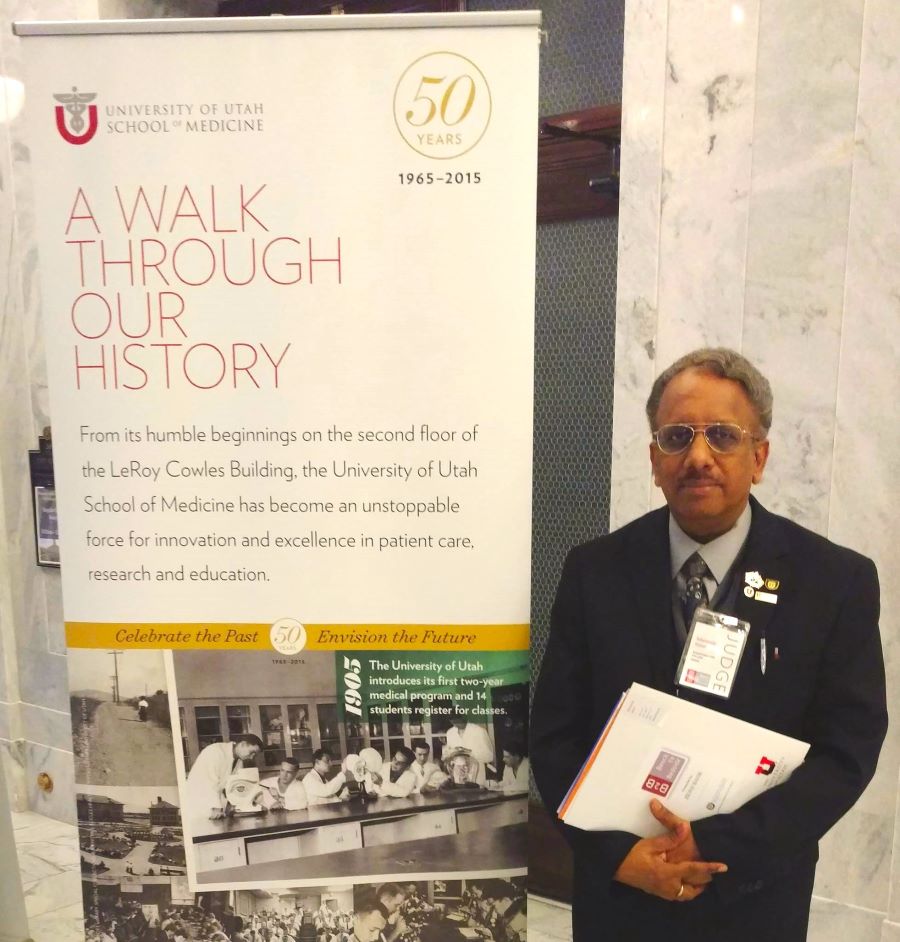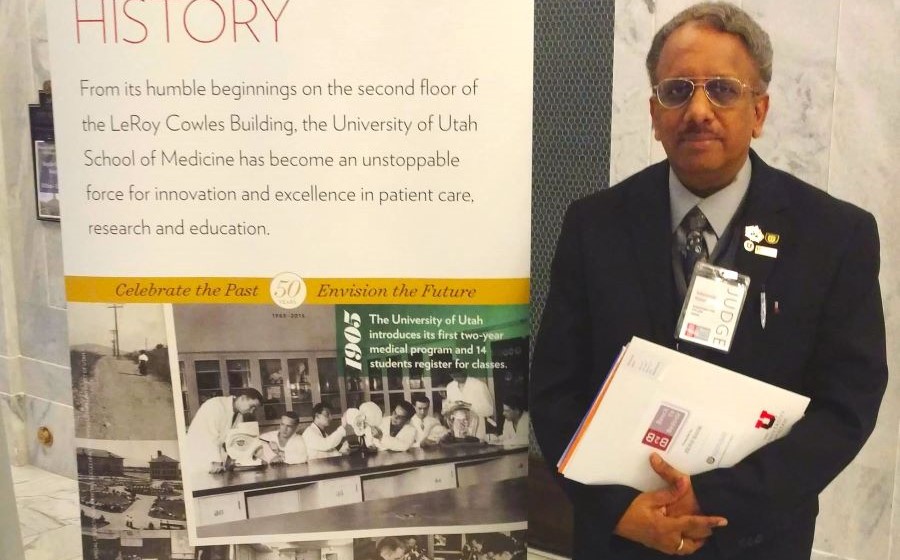BY VEENA RAO
In a recent interview with Dr. Bellamkonda Kishore, an accomplished figure in academic research and education leading to entrepreneurship, NRI Pulse gained insights into his remarkable journey, his philosophy on life, and his advice for aspiring researchers, entrepreneurs, and individuals looking to make a positive impact on society.
Sandy, Utah-based Dr. Kishore is a physician-turned-scientist with an M.D. and a Ph.D. in kidney pathophysiology. He has forged an illustrious career in academic research, innovation, and entrepreneurship. His expertise in cell biology, molecular and transport physiology, and pharmacology of the kidney laid the foundation for innovative discoveries in purinergic signaling – a relatively new field with a vast potential for the development of novel drugs. Dr. Kishore earned a prestigious Executive MBA degree from the University of Utah, which seamlessly facilitated his transition to entrepreneurship.
As the Co-Founder, President, CEO & CSO of ePurines, Inc., a startup in the University of Utah Research Park, Dr. Kishore leads the charge in bringing purinergic signaling-based therapies for various disease conditions to the market. Inducted as a Senior Member of the National Academy of Inventors, and a Fellow of several esteemed societies, Dr. Kishore has left an indelible mark on the medical landscape.
Beyond academia, he is a dedicated community servant and has received accolades, including the Nelson Mandela Leadership Award from the NRI Welfare Society in India, and honors from the AAPI, NATA, and TANA in the United States. Dr. Kishore is also an accomplished writer and composer of poems in English and Telugu. He published two motivational books. He is a gifted artist and photographer with prizes to his credit since his college days. Dr. Kishore is also an avid singer of devotional songs and leads Bhajans.
Dr. Kishore’s journey is a testament to the power of unwavering passion, focus on meaningful work, and living a purpose-oriented life. His wisdom and work serve as a valuable guide for those looking to make a positive impact on society.

Dr. Kishore, can you share highlights from your academic and research journey?
I did not start my career with a preconceived idea of what I wanted to achieve. I had a passion for science and creative hands-on activities from a young age. My focus was always on the work itself, not on achieving a specific goal. As I continued working diligently, opportunities unfolded, and I progressed step by step. The key was to focus on my work, find meaning and value in what I do, and have confidence and faith that my work has a greater purpose. The rest of the things kept falling in their place in due course. I had passion, perseverance, and patience (3Ps) to let my life unfold by itself.
What motivated you to move from academia to entrepreneurship?
Initially, my career was deeply rooted in academic research, with no intention of founding a company. I was primarily interested in understanding disease mechanisms, publishing papers, and obtaining research grants. However, when I moved to Utah in 2001, I had a chance encounter with a researcher-turned-entrepreneur who encouraged me to think about innovation and the development of intellectual property. This led me to keep an eye on and explore the commercialization potential of my research findings. Chance favors the prepared mind. Supported by the University of Utah’s Technology Commercialization Center, and the US Department of Veterans Affairs Technology Transfer Program, by 2018 I ended up with nine discoveries with patents issued or pending. Then, the pressure to commercialize intellectual property mounted on me, and eventually, I took the risk and co-founded ePurines.
Moving from a respectable professor position in the University of Utah Health, and a secure Principal Investigator position in the VA Medical Center, to starting a company was a significant transition in my life. Fortunately, this transition came at a point when my children were grown up and are independent. I had more freedom, which made the risk manageable. But I retained a faculty role at the university as an Adjunct Professor of Internal Medicine, while establishing the company in the Research Park. Thus, I didn’t completely sever ties with academia.
What is the goal of ePurines, and where do you see the company in the next five to ten years?
Non-communicable diseases (NCDs), such as diabetes mellitus, hypertension, cardiovascular diseases, chronic lung diseases, cancers, and chronic kidney diseases account for 41 million deaths (71% of all deaths) globally and are expected to reach 52 million deaths by the year 2030. NCDs are not only responsible for human suffering but cause huge economic burdens on nations. Obesity is the mother of most NCDs. ePurines is developing novel purinergic-signaling based solutions for obesity and NCDs, with a primary focus on diseases of the kidney, liver, heart, and lung. The vision and mission of ePurines are to design and develop drugs that are not only effective but also accessible to people worldwide, not just in affluent countries. ePurines, a spin-out from the University of Utah and Veterans Affairs Medical Center, is driven by a vision and mission to serve humanity, with profits as a byproduct of our efforts. The products of ePurines will reach emerging markets as well as developing countries, i.e., the bottom of the pyramid, where people suffer the most due to NCDs due to a lack of mature healthcare systems.
Can you tell us more about your co-founder, Dr. Simon Robson, and your collaboration in the field of purinergic signaling?
My long-term collaborator and Co-Founder, Prof. Simon Robson, M.D., Ph.D., is an internationally known academic physician in gastroenterology, liver diseases, and transplantation in Beth Israel Deaconess Medical Center, Harvard Medical School. We have been collaborating for over two decades, researching purinergic signaling, which plays a crucial role in various organs, including the kidney and liver. The language of purinergic signaling is universal – like coding in computer software – allowing us to apply our research across different areas of medicine. This is the beauty of understanding the human body at a fundamental molecular signaling level. Thus, our collaboration has led to multiple publications, grants, and the discovery of innovative technologies that can treat various diseases.
You have received various awards for your community service. What do these recognitions mean to you?
Community service has always been an integral part of my life, beginning even before my medical school days. It offers me a sense of satisfaction, accomplishment, and purpose in life that can’t be matched by anything else. The recognition and awards I’ve received were never my primary goal, but they highlight the importance of giving back to society. I believe in working with full dedication and commitment, which has led to my involvement in various organizations and projects.
You mentioned the importance of purpose-oriented living. Could you elaborate on this philosophy?
Living with a sense of purpose is crucial. Life is not just about succeeding, making money, and building wealth, or having a comfortable life. When we set a clear purpose and pursue it relentlessly, we face challenges that push us to improve and develop self-discipline, and thus transform into better humans. A passionate purpose-oriented life will take us to far regions where an ambitious success-driven life cannot even dare to peep in. The result of such a passionate purpose-oriented life is immense inner happiness and a sense of accomplishment. A purpose-oriented life also expands our consciousness and helps to expand the collective consciousness in the community we work.
What advice do you have for those aspiring to be researchers, entrepreneurs, or individuals looking to make a positive impact in society?
Research and entrepreneurship demand a mindset willing to take risks, like designing a new model of airplane. It’s about creativity and treading unexplored paths, not just following established paths. We should encourage children to think creatively from an early age and not just focus on education and career alone. Beyond personal success, contributing to the community is vital. Become a role model, motivate others, and work towards expanding consciousness. As Dr. Govindappa Venkataswamy, the founder of Arvind Eye Care System aptly said “Intelligence and capability are not enough. There must also be the joy of doing something beautiful.”
Any final thoughts or messages you’d like to share with our readers?
My journey from academia to entrepreneurship has been filled with many challenges, learning, unlearning and relearning experiences. The path of entrepreneurship can be lonely, but it’s essential to have a strong network of support and mentors and/or peers to chisel and sculpt us when needed. When involved in community service, remember that full commitment and dedication can lead to significant positive impacts, which increases your value in the community.
Regarding ePurines, our aim is to make a difference in the world of non-communicable diseases and provide accessible solutions all over the world that improve people’s lives. We are focused on serving humanity, and our mission is at the forefront of everything we do.
LinkedIn Profile of Dr. Kishore: https://www.linkedin.com/in/bkishore369/





